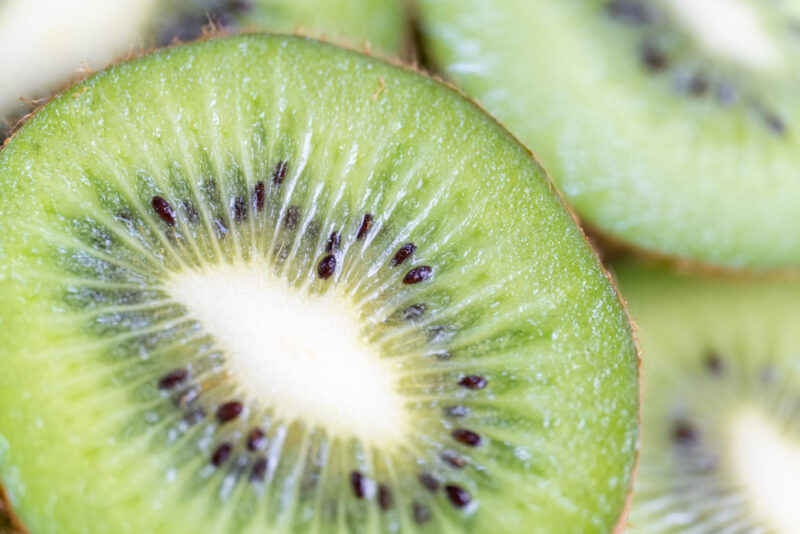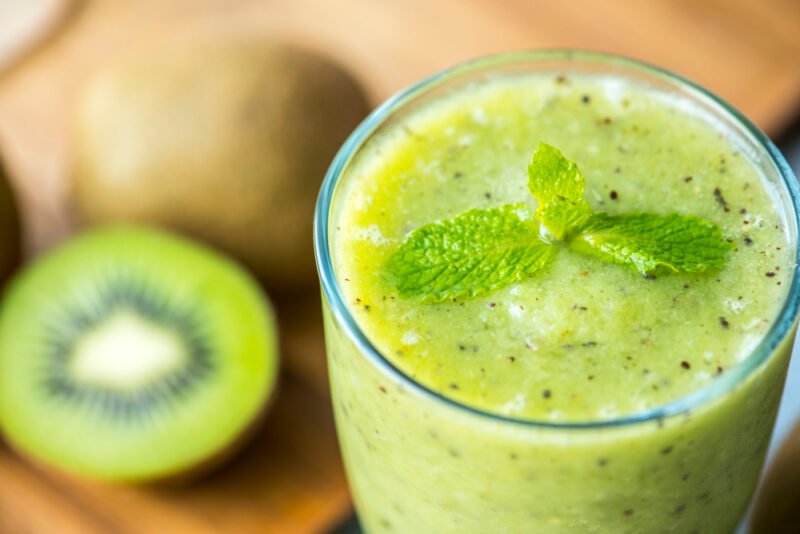Ease the burden of suffering chronic constipation by eating this one thing regularly
While constipation has several causes, individuals may experience it differently based on their sensitivity to emotions, stress, and food.
For those seeking a natural remedy to alleviate constipation, kiwi fruit consumption has emerged as a promising option.
Not only does kiwi help promote regular bowel movements, but it also offers numerous health benefits, including a rich nutritional profile.
Kiwi offers many health benefits beyond its impact on digestive health.
Rich in Vitamin C: Boosting Immunity and Collagen Production
Kiwi is renowned for its amazing vitamin C content. A single kiwi fruit provides more than the daily recommended vitamin C intake, making it an excellent immune-boosting fruit. Vitamin C is vital in strengthening the immune system, protecting against common infections, and promoting faster wound healing.
A study published in the Journal of Nutritional Science and Vitaminology investigated the immune-enhancing effects of kiwi consumption. The results indicated that regular consumption of kiwi significantly improved immune function, including enhanced antibody response and increased white blood cell activity. These findings highlight the immune-boosting potential of kiwi fruit.
Additionally, vitamin C is essential for collagen synthesis, a protein that contributes to the structure and health of the skin, bones, and blood vessels. Kiwi’s high vitamin C content can help promote healthy skin, support bone health, and contribute to cardiovascular wellness.
Abundant in Dietary Fiber: Supporting Digestion and Weight Management
Kiwi is an excellent dietary fibre source, with soluble and insoluble fibre present in its flesh and seeds. This fibre content is crucial in supporting digestive health and maintaining healthy bowel movements.
A study published in the Journal of the Science of Food and Agriculture investigated the effects of kiwi consumption on gastrointestinal health. The findings revealed that kiwi significantly improved bowel regularity and stool consistency, contributing to a healthy digestive system. The fibre in the kiwi adds bulk to the stool, promoting regular bowel movements and preventing constipation.
Furthermore, the high fibre content in kiwi contributes to feelings of satiety, making it a valuable fruit for weight management. A study published in Nutrients found that individuals who consumed kiwi experienced increased feelings of fullness and reduced calorie intake compared to those who consumed other fruits. This suggests incorporating kiwi into a balanced diet may support weight loss or maintenance efforts.
Antioxidant Powerhouse: Protecting Against Oxidative Stress
Kiwi is rich in antioxidants, including vitamins C, E, and various phytochemicals. These antioxidants are crucial in neutralizing harmful free radicals and protecting cells from oxidative damage.
A study published in the Journal of Agricultural and Food Chemistry evaluated the antioxidant capacity of kiwi fruit. The results demonstrated that kiwi exhibited significant antioxidant activity, effectively scavenging free radicals and reducing oxidative stress. Antioxidants in kiwi may help protect against chronic diseases, such as cardiovascular disease, cancer, and age-related macular degeneration.

Supporting Heart Health: Lowering Cholesterol and Blood Pressure
Regular consumption of kiwi has been associated with several cardiovascular benefits. The fibre and antioxidant content in kiwi contributes to heart health by reducing cholesterol levels and maintaining healthy blood pressure.
A study published in the Journal of Nutritional Biochemistry investigated the effects of kiwi consumption on cholesterol levels. The results showed that individuals who consumed kiwi experienced a significant reduction in LDL cholesterol (the “bad” cholesterol) and an increase in HDL cholesterol (the “good” cholesterol). These favourable changes in cholesterol profile contribute to a lower risk of heart disease.
Moreover, kiwi’s high potassium and low sodium content benefit the cardiovascular system and promote healthy blood pressure.
A study published in the Journal of the American College of Cardiology examined the relationship between potassium intake and blood pressure.
The findings indicated that increased dietary potassium intake, such as that provided by Kiwi, was associated with lower blood pressure levels.
The Power of Kiwi: An Overview
Kiwi, a small fruit with vibrant green or gold flesh, is known for its tangy flavour and unique appearance. Beyond its delightful taste, kiwi packs a punch regarding nutritional content. High in vitamin C, folate, fibre, potassium, antioxidants, and enzymes, kiwis offer a range of health advantages in addition to their potential as a natural remedy for constipation.
Scientific Studies on Kiwi and Constipation
Several Asian studies have explored the efficacy of kiwi in relieving constipation. Randomized trials compared the effects of kiwi consumption with psyllium and prunes in patients with chronic constipation. Researchers analyzed various factors such as spontaneous bowel movements, daily stool frequency, consistency, and straining during the four-week study period.
The findings of these studies revealed significant improvements in stool consistency and reduced straining among participants who consumed kiwi and prunes. Moreover, bloating was significantly less pronounced in the kiwi group compared to the prune and psyllium husk group.
Many patients reported experiencing side effects such as bloating and bowel discomfort with prunes and psyllium, making Kiwi a favourable alternative for managing constipation.
Moreover, another study focused on gold-fleshed kiwi and its impact on bowel movements and gastrointestinal discomfort in mildly constipated patients. The results demonstrated a substantial increase in the frequency of spontaneous bowel movements and a reduction in gastrointestinal discomfort upon consuming gold-fleshed kiwi.
Additionally, green kiwi positively affected bowel movements and alleviated symptoms associated with irritable bowel syndrome, including bloating, gas, and abdominal pain.

Understanding the Mechanism: How Kiwi Aids in Relieving Constipation
Kiwi contains various components that contribute to its effectiveness in alleviating constipation. The fibre content in kiwi plays a crucial role in promoting regular bowel movements. The soluble fibre in kiwi absorbs water, adding bulk to the stool and softening it, making it easier to pass through the digestive tract.
Furthermore, kiwi is rich in actinidin, an enzyme that aids digestion and enhances gut motility. This enzyme assists in breaking down proteins, facilitating food movement through the digestive system. Improved gut motility helps prevent the stool from becoming stagnant and promotes its smooth passage, thus alleviating constipation.
Kiwi’s Role in Overall Digestive Health
Beyond its impact on constipation, kiwi offers a range of benefits for overall digestive health. The presence of fibre in kiwi aids in maintaining a healthy gut environment and supports the growth of beneficial gut bacteria. A healthy gut microbiome is essential for optimal digestion and nutrient absorption.
When maintaining a healthy digestive system, kiwi fruit goes beyond its role in relieving constipation. The unique combination of nutrients and enzymes found in kiwi provides several benefits for overall digestive health. From supporting a balanced gut microbiome to aiding in nutrient absorption, kiwi can contribute to a well-functioning digestive system. In this section, we will delve into the research and explore kiwis’ remarkable digestive role.
Promoting a Healthy Gut Microbiome
Maintaining a diverse and balanced gut microbiome is crucial to digestive health. The gut microbiome consists of trillions of bacteria that are vital to digestion, immune function, and overall well-being. Research has shown that consuming kiwi can positively influence the gut microbiota composition.
A study published in the Journal of Nutritional Biochemistry investigated the effects of kiwi consumption on the gut microbiota. The findings revealed that participants who consumed kiwi experienced an increase in beneficial bacteria, such as Bifidobacterium and Lactobacillus, known for their positive effects on digestion and immune function.
These results suggest regular kiwi consumption promotes a healthy gut microbiome.
Enhancing Nutrient Absorption
Proper nutrient absorption is essential for overall health, and kiwi can play a role in this process. Kiwi is rich in vitamin C, a powerful antioxidant that aids in iron absorption from plant-based sources.
Iron is an essential mineral for producing red blood cells and transporting oxygen throughout the body.
A study published in the American Journal of Clinical Nutrition investigated the impact of kiwi consumption on iron absorption. The results showed that consuming kiwi alongside iron-rich foods significantly enhanced iron absorption compared to consuming iron-rich foods alone. This suggests that incorporating kiwi into meals can help improve the body’s utilization of iron, thereby supporting overall nutrient absorption.
Anti-inflammatory Properties
Inflammation in the digestive system can lead to various digestive disorders and discomfort. Kiwi’s high antioxidant content, including vitamin C and other phytochemicals, contributes to its anti-inflammatory properties. These antioxidants help neutralize harmful free radicals and reduce inflammation in the gastrointestinal tract.
A study published in the Journal of Agricultural and Food Chemistry investigated the anti-inflammatory effects of kiwi extract on human cells. The findings demonstrated that kiwi extract inhibited the production of pro-inflammatory cytokines, which are markers of inflammation.
This suggests that kiwi’s anti-inflammatory properties contribute to maintaining a healthy digestive system.
Incorporating Kiwi Into Your Diet for Constipation Relief
To experience the benefits of kiwi for constipation relief, to help you make the most of kiwi’s potential:
Add Kiwi to Your Breakfast: Start your day by including Kiwi in your breakfast routine. You can slice and enjoy it, blend it into a smoothie, or mix it with yogurt or cereal for a nutritious and fibre-rich meal.
Kiwi as a Snack: Kiwi makes an excellent snack option, whether you’re at work, school, or on the go. Simply peel and slice the fruit beforehand and pack it in a container to enjoy its natural goodness whenever hunger strikes.
Kiwi in Salads: Incorporating kiwi into your salads can add a refreshing twist to your meals. Its tangy flavour pairs well with leafy greens, nuts, and dressings, providing a delightful contrast of taste and texture.
Kiwi in Salsa or Chutney: Get creative in the kitchen by experimenting with kiwi in homemade salsas or chutneys. Combine diced kiwi with other fruits, vegetables, herbs, and spices to create a flavorful accompaniment for grilled meats, fish, or chips.
Kiwi in Desserts: Kiwis can be a delicious addition to various desserts. Whether you’re making fruit salads, sorbets, or pies, kiwi’s vibrant colour and tangy flavour can elevate the taste and presentation of your sweet treats.
Conclusion
Constipation is a common issue that can significantly impact one’s quality of life. While various remedies are available, incorporating natural and healthy options into your routine is essential for long-term relief. Kiwi fruit has emerged as a promising solution, supported by scientific research and studies. With its high fibre content, enzymes, and nutritional profile, kiwi helps promote regular bowel movements and offers additional health benefits. By including kiwi in your diet, you can alleviate constipation, reduce symptoms of bloating and gas, and support overall digestive health.
Remember, listening to your body and making dietary adjustments based on your needs is crucial.
If you have any underlying medical conditions or concerns, it’s advisable to consult with a healthcare professional before making significant changes to your diet.
Embrace the power of kiwi as a natural and delicious way to overcome constipation and enhance your well-being.
Have you tried using Kiwi for constipation relief? We’d love to hear about your experiences and any additional tips or recipes you’d like to share.
You can also follow me on YouTube for the latest, science-backed research on health, weight and weight training, and an endless supply of healthy recipes.
You may also like to download my FREE Fat Loss Recipe book.
I appreciate your support.

1 Comment